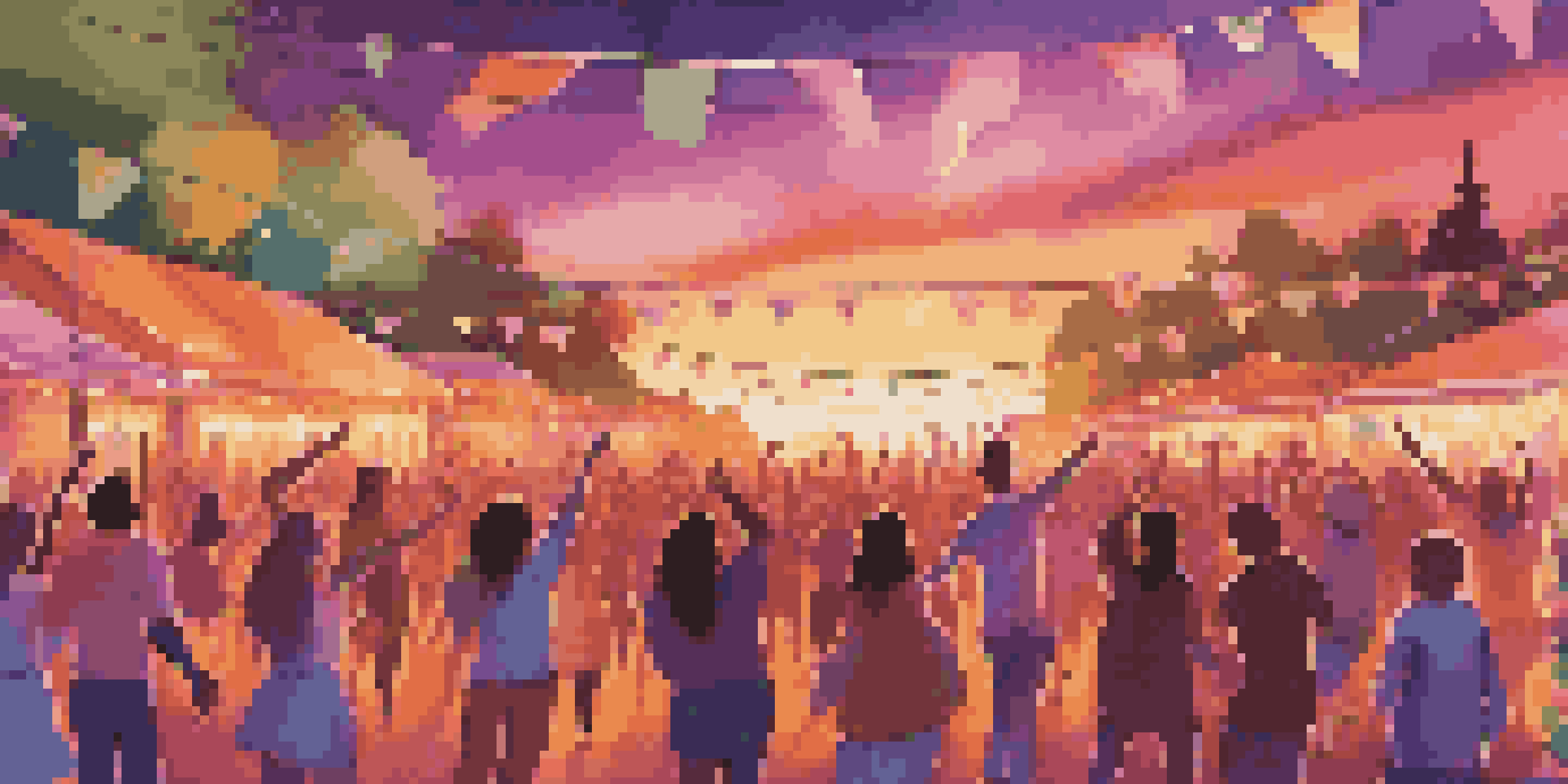The Role of Music in Shaping Post-Pandemic Identity Politics

The Healing Power of Music in Troubling Times
During the pandemic, music became a lifeline for many, serving as a source of comfort and connection. Whether it was through virtual concerts or shared playlists, people found solace in melodies that resonated with their experiences. This collective listening experience helped to foster a sense of community, even when physical gatherings were impossible.
Music can change the world because it can change people.
As restrictions eased, the healing properties of music continued to play a crucial role in people's lives. It acted as a catalyst for emotional expression and reflection, allowing individuals to process the tumultuous events they had endured. The shared experience of music not only comforted but also united people across diverse backgrounds.
This newfound appreciation for music has led to a deeper understanding of its role in identity formation. As individuals navigate their post-pandemic realities, music becomes a significant element in redefining who they are and how they connect with others.
Music as a Reflection of Social Movements
As the pandemic unveiled systemic inequalities, music emerged as a powerful tool for social change. Many artists began using their platforms to address issues such as racial injustice, mental health, and economic disparities. This trend resonated deeply with listeners, who found empowerment through songs that spoke to their struggles and aspirations.

The intersection of music and activism has opened up new dialogues about identity politics. For instance, genres like hip-hop and punk, known for their rebellious spirit, have become vehicles for marginalized voices. This not only amplifies these voices but also encourages listeners to engage with and reflect on their own identities and beliefs.
Music as a Source of Healing
During and after the pandemic, music provided comfort and a sense of community, helping individuals process their experiences.
Through music, individuals are not just passive consumers; they become part of a broader conversation about social justice. This engagement helps to create a collective identity that transcends personal experiences, fostering unity around shared goals.
Empowerment Through Personal Narratives in Music
Post-pandemic, many artists are sharing personal stories that resonate with listeners' experiences. These narratives often reflect themes of resilience, recovery, and self-discovery, making them relatable to a wide audience. By expressing vulnerability, artists empower others to embrace their own stories and identities.
Where words fail, music speaks.
This emphasis on storytelling in music allows for a richer exploration of identity politics. As people listen to songs that mirror their feelings, they find validation and strength in their own narratives. In this way, music becomes a powerful medium for personal and collective empowerment.
Moreover, the act of sharing these stories contributes to a sense of belonging. Listeners realize they are not alone in their struggles, fostering connections that strengthen community bonds and shape identity.
The Role of Genres in Identity Formation
Different music genres carry distinct cultural meanings, which can significantly influence identity. For instance, folk music often reflects local traditions and histories, while pop music may encapsulate contemporary societal trends. As individuals explore these various genres, they may discover aspects of their identity they hadn't previously recognized.
In the wake of the pandemic, many are seeking out music that aligns with their evolving beliefs and values. This exploration can lead to a more nuanced understanding of their own identities and how they relate to broader societal issues. As a result, the music people choose often reflects their aspirations and the communities they wish to be part of.
Empowerment Through Storytelling
Artists sharing personal narratives in their music foster empowerment and connection, allowing listeners to embrace their own stories.
Genres, thus, serve not just as entertainment but as a lens through which individuals can navigate their identities. By engaging with different musical styles, people can cultivate a more inclusive and multifaceted sense of self.
Music's Impact on Online Communities and Identity
The rise of digital platforms during the pandemic has transformed how people connect over music. Online communities centered around specific genres or artists have flourished, allowing individuals to share their passions and experiences. These virtual spaces often provide a sense of belonging that may be lacking in physical environments.
As people engage with these communities, they often find their identities being shaped by shared interests and collective experiences. The discussions, collaborations, and interactions foster a sense of camaraderie, reinforcing individual and group identities. Such online connections can be particularly important for those who feel isolated or disconnected in their daily lives.
This digital landscape not only democratizes access to music but also amplifies diverse voices. As individuals navigate their identities within these communities, they contribute to a larger narrative that celebrates inclusivity and authenticity.
The Role of Music Festivals in Rebuilding Identity
As the world slowly reopened, music festivals emerged as a beacon of hope. These events offered a space for communal celebration and connection, allowing people to reunite and share their love for music. The atmosphere of joy and unity at these festivals played a significant role in rebuilding identity after a long period of isolation.
Festivals often serve as melting pots of diverse cultures and backgrounds, showcasing the power of music to bridge divides. Attendees come together to celebrate not just the music but also the shared experience of being part of a larger community. This sense of belonging is crucial for individuals redefining their identities in a post-pandemic world.
Festivals Rebuilding Community Identity
Music festivals serve as communal spaces for celebration and connection, playing a crucial role in reshaping identities in a post-pandemic world.
Moreover, the performances often reflect contemporary issues, providing a platform for artists to voice their perspectives on identity politics. The synergy between artists and audiences creates an environment where collective identity can flourish, reinforcing the significance of music in shaping social narratives.
Conclusion: Music as a Catalyst for Identity Exploration
In the wake of the pandemic, music has emerged as a powerful catalyst for exploring and reshaping identities. From personal narratives to collective movements, the impact of music on identity politics is profound and far-reaching. As individuals reconnect with their passions and communities, they find themselves navigating an evolving landscape of identity.
The diverse ways in which people engage with music—whether through listening, creating, or sharing—highlight its role as a tool for empowerment and connection. This exploration encourages individuals to embrace their complexities and foster understanding within their communities.

Ultimately, music serves as a reminder of our shared humanity, bridging gaps and encouraging dialogue. As we continue to navigate the post-pandemic world, the lessons learned from our musical journeys will undoubtedly shape our identities for years to come.